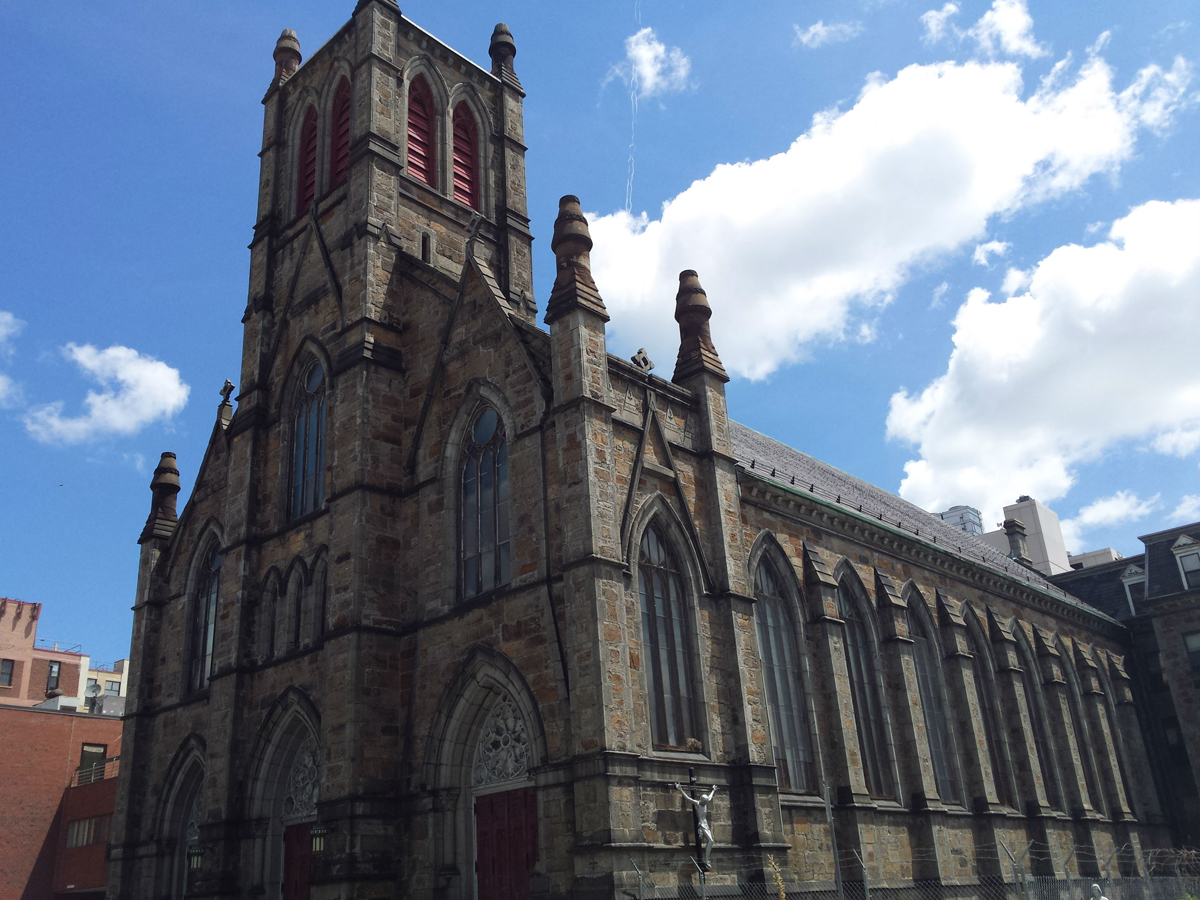Archdiocese of Boston Lists South End Church for Sale

Photo by John Keith
The Holy Trinity (German) Church was listed for sale on Tuesday by Colliers International. The Roman Catholic church, located on Shawmut Avenue in the South End, is owned by the Archdiocese of Boston, which closed the church in 2008 and deconsecrated it in 2012. In a statement, James Elcock of Colliers told the Boston Business Journal that the Archdiocese “will consider all offers” and believes the property could end up being sold to a residential (housing) developer for as much as $4 million.
The Holy Trinity, built in 1877, was known between 1990 and 2007 for being the only area church at the time where the Tridentine (Traditional Latin) Mass was celebrated, so when the Archdiocese announced it was closing, the news hit hard the 200 or so regular parishioners. To the Archdiocese, closing and selling the Holy Trinity must make a lot of sense: the church is in the rapidly changing neighborhood located between the South End and Chinatown, where several hundred condos and apartments are under construction and several hundred more either approved or proposed. And, the timing is right. The Holy Trinity church and rectory were briefly listed for sale in 2011 for $2.3 million, and now the Colliers real estate agent thinks he can get another $1.7 million for it.
But there’s usually a catch. The Catholic Church adds “restrictive covenants” to many of its real estate contracts. Restrictive covenants basically tell the buyer/new owner what can and cannot be done with the new property. And covenants don’t just restrict what the first buyer can do with the property; it runs with the land, meaning it must be included as a condition in any subsequent purchase agreements by future buyers, for as long as the contract requires. It’s basically like a town or city’s zoning regulations but sometimes more restrictive and oftentimes extremely specific.
Here is the restrictive covenant written into a Purchase & Sale Agreement by the Archdiocese of Boston regarding a parcel of land the church was negotiating to sell to the Town of Wellesley:
“Grantee covenants and agrees for itself, its successors and assigns and successors in title that it shall not use or permit the use of the Premises for: (a) a church, chapel or other house of religious worship: (b) a facility at which abortions, assisted suicide or euthanasia occurs; (c) the operations of professional counseling services which advocate abortion, euthanasia or suicide; (d) the operations of any embryonic stem cell research facility or services implementing embryonic stem cell research, or (e) a school or educational facility (but not including educational uses accessory to recreational uses of the Property, or a public elementary, middle or high school operated by the Town of Wellesley under the care and custody of the Wellesley School Committee, all of which will be permitted) The Use Restrictions shall expire upon the 90th anniversary of the signing of the date of the recording of the Deed.”
The town had no intention of performing abortions or euthanizing anyone on the site—it was hoping to build a swimming pool or skating rink—but the church required the language, nonetheless. Several Wellesley residents took exception to this, believing it forced the town to acquiesce to the demands of the church in violation of the First Amendment, so they looked into hiring the American Civil Liberties Union to investigate. The sale moved forward, though, after the covenants were removed, and the town voted to approve the purchase in June 2012.
There’s another case going on right now where restrictive covenants could have come into play. A gay couple is suing the Diocese of Worcester over what they say was a case of discrimination based on their sexual orientation. The couple had offered to buy a parcel of land owned by the diocese for use as a banquet facility and as a personal residence, according to the Worcester Telegram & Gazette. They allege the church ended negotiations because it feared the couple would be hosting same-sex weddings. According to the Telegram, the church says it backed out because the potential buyers lacked financing.
In this case, the negotiations never progressed to a written contract, but in the past, contracts written by the Catholic Church have included language forbidding the use of church property for anything which is contrary to the religious teachings of the Catholic Church. It can be assumed that two guys getting married on the lawn of the Oakhurst Retreat would qualify as contrary to church doctrine. The case is headed to trial, but a date has not yet been set.
It’s possible that any contract drawn up between the Archdiocese of Boston and a potential buyer of the Holy Trinity won’t include any restrictive covenants. I called Colliers and the Archdiocese for comment and will update this post if I hear anything back.
It’s not just the church and the buyer who could be affected if the contract includes restrictive covenants. The Colliers listing agents on this property are walking on dangerous ground, in my opinion, if they allow any language limiting what the land can be used for, or if it’s even implied that the new owner will be forbidden to use the property in a way that would violate state laws. Both the Holy Trinity and the Worcester Diocese deals involved real estate agents so this is a real question. But whether Collier truly means it will consider all offers is the even bigger one.


